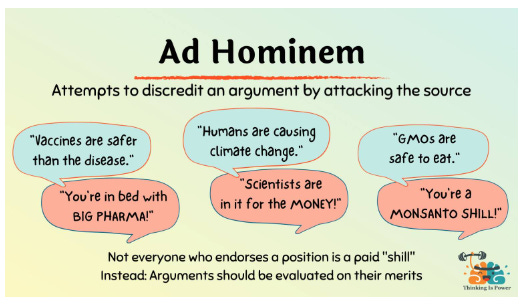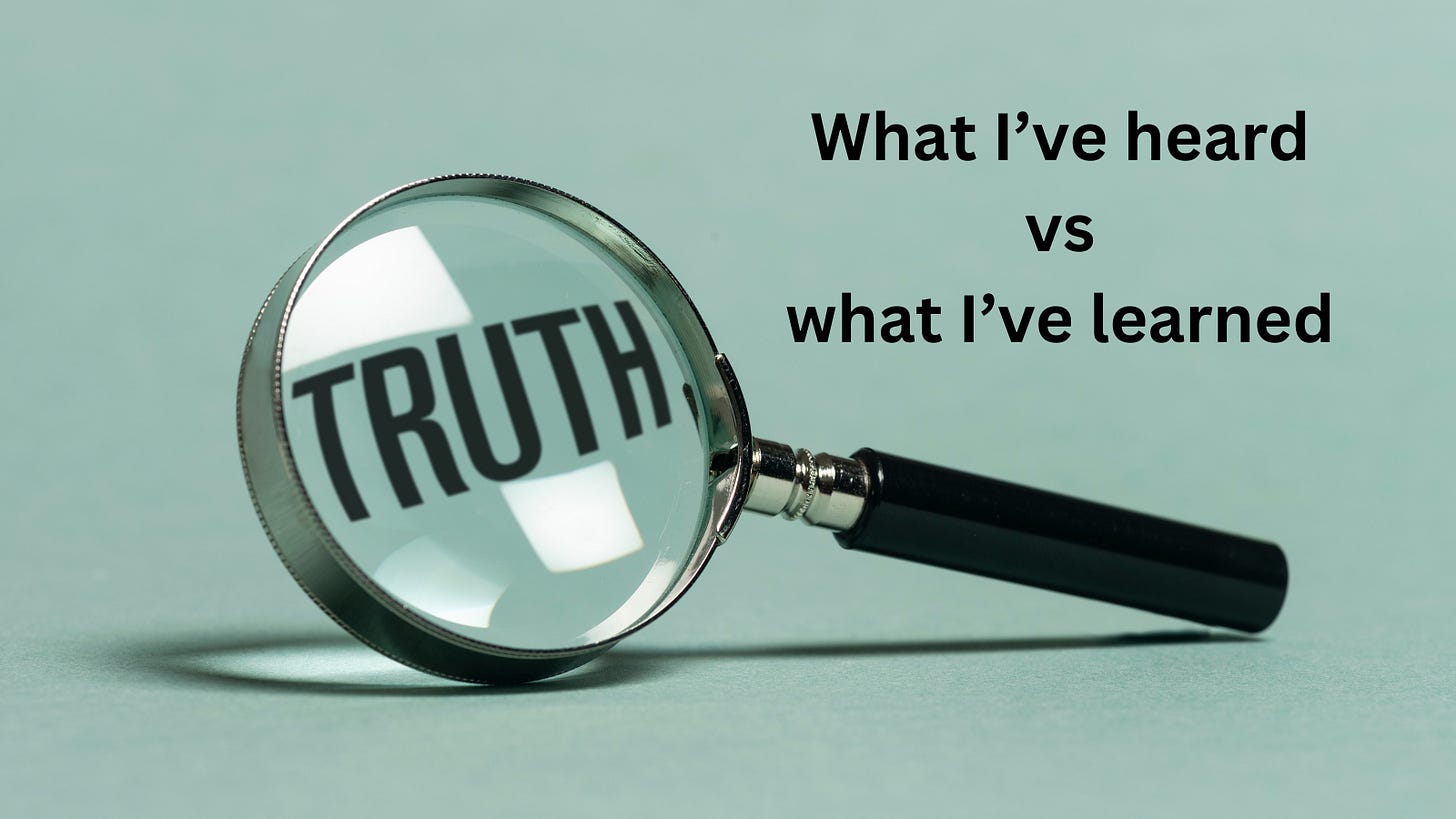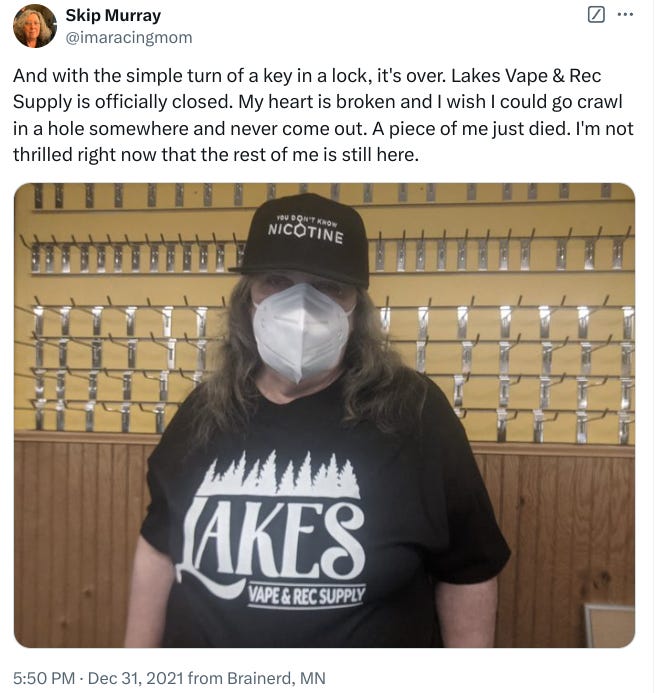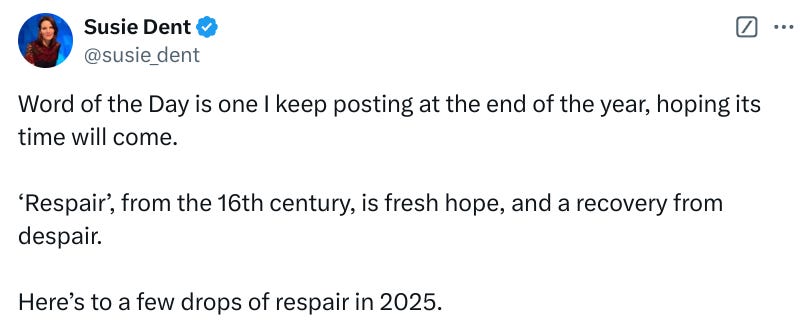The Ghost of New Year's Past
There's a conflict between what I've heard and what I've learned.
I wouldn't be here today without the Ghost of New Year’s Future.
*Awareness warning: Information presented in this blog post may trigger some people. It discusses active suicidal ideation.*
This is the 2nd day in a row that I want to share my thoughts with you about New Year’s. That will be your first clue that it’s a big deal to me. It is an opportunity for reflection, a fresh start, and a good time to choose what we want to do in the coming months.
I want to share what happened on New Year’s Eve 2021 and what I’ve heard and learned since that fateful night. Some people’s words have not been kind, and some of my thoughts have lacked generosity in considering the intentions of others.
The flood of misinformation I’ve heard in past years continued throughout 2024, and those misperceptions heavily influenced policies. Because of all of this, it is easier to purchase lethal cigarettes than to buy something less harmful in some places. The ramifications of that overwhelm me with sadness.
The hardest lesson for me to accept is that change takes time and doesn’t always go in our desired direction. It’s been uncomfortable to watch how ugly people can be to each other and hear how they weaponize their words. It’s hard not to fall into that trap, exhibit the behavior I’ve seen, and repeat the inaccurate words about others I’ve heard.
I have spent the last couple of years trying to learn more about this. I don’t like conflict. It has been a challenge to get comfortable handling it more constructively. When I was young, I learned to fight back in the most vicious way I could. It is how I learned to survive. My words were my most effective weapon. They could make almost anyone cry.
I thought I was winning back then. But, in reality, it never solved any problems. It pushed some people away. It made other people target me even more than they did before. Now, I don’t want to fight anymore. I want to seek solutions.
For me, seeking solutions meant I had to stop believing everything I heard about people. It meant I needed to get to know and be curious about them. I had to listen. One of my favorite mantras I try to follow is “Be curious, not judgemental.” I’m not sure where it originated (maybe from a movie). I became aware of it when I heard Joe Gitchell say it. I liked the message so much that I thought he should preach it to everyone, so I gifted him a button with that saying.
I am struggling to have a hopeful outlook for tobacco harm reduction in 2025. As 2024 drew to a close, I reflected on 2021, when I closed my vape shop on New Year’s Eve. I, like many people who use nicotine, struggle with mental health challenges. I find myself struggling today to ward off the depression that often clouds my life. It is harder to fight depression when a person lacks hope.
It often feels like we’re fighting a war instead of joining forces to save lives. It’s a real hope sucker. I don’t see enough curiosity and too much judgment.
Some people who try to discredit tobacco harm reduction (THR) tend to make unfounded accusations about those who support the use of these products. The opposite is also true. Some people who support THR jump to conclusions about those they disagree with and make their own unfounded accusations.

It’s like watching a strange game of volleyball. The ball is made of slimy mud and coated with stinging nettles. I watch the ball get volleyed back and forth, covering people with slime and inflicting more pain, but no one ever wins the game.
On one of the darkest days of my life, I embarked on a journey that showed me that much of what I had heard wasn’t true. I’m sure many of you have heard (and maybe even said) what I’ve heard.
I have heard that academics live in Ivory Towers and have no idea what life is like for the average person. They don’t care about us or what we have to say.
At first, this was easy for me to believe. At one point in my life, if I knew someone had a PhD, I instantly disliked them. A bad experience when I was younger led me to put everyone “with fancy letters after their names” in one foul-smelling basket. Not only did I not like them, but I was afraid of them.
Being in the public health advocacy space has exposed me to many people with “fancy letters.” At first, I lashed out at some of them, believing they had nothing valuable to offer people like me.
I learned that what I heard and believed wasn’t true. I have met many of these people, and I realized most of them care about good science and are trying to be helpful. They were eager to hear my perspective, expressed gratitude for my work, offered support, and spoke to me with kindness and respect.
Along the way, I’ve met several of them who believe in the importance of THR as much as I do. I have been impressed with several who have followed the science closely; some have even changed their minds. No one will ever be able to tell me again that academics don’t care and have me believe it because I’ve seen how big their hearts are.
One of my favorite social media bios belongs to Dale Mantey. He says, “And I still prefer my trailer park to these Ivory Towers.” In my lifetime, I’ve lived in a trailer park twice. Some good people are living in trailer parks. Goodness can be found anywhere. It is not dependent upon where one lives or what letters follow one's name.
I have heard that those working for tobacco control nonprofit organizations want to run our lives for us, tell us what to do, and think we should live how they want us to live. They don’t want us to use nicotine, and they will lie through their teeth to convince policymakers to ban things. I’ve heard their brains are poisoned with Bloomberg dollars.
At first, this one made sense to me. If people want to prohibit what is helping some of us quit smoking, they must be control freaks, right? They must believe in “quit our way or die.” How else do you explain the misinformation and the strong push to ban reduced-risk products? This would justify what feels like a fanatical adherence to what Michael Bloomberg wants.
It was so easy for me to hold onto believing all this until I started meeting people who belonged to some of those organizations. They were not lying. They thought the information they shared was the truth when often it was not. They cared about people and wanted to improve public health. They felt they were protecting children.
I’ve met some who have changed their minds and worked to influence their organizations to reconsider their stance on tobacco harm reduction. I was wrong about some of these people and owe them an apology.
I have heard that people who own vape shops are in it for the money. It has nothing to do with helping people who smoke. These owners want to perpetuate addiction, so they have forever customers.
In my shop, like shops worldwide, we listened to our customers. If quitting smoking is what they wanted to do, that’s what we supported them doing. After successfully quitting smoking, some wanted to quit vaping. We helped them do that, too. It was part of what hurt the profitability of my business; I worked to lose customers by assisting them in not using the products I sold.
Add in losing sales due to burdensome regulations and too much misinformation to debunk, and it’s easy to see why my business failed. I wasn’t the only small business owner who couldn’t stay in business and thought there was no reason to remain on Earth.
Please don’t tell me that some of us are only in it for the money; I have experienced the pain of losing the ability to help people. That pain almost cost me my life! It’s been 3 years since closing my shop, and that pain continues to toss me into the darkness around New Year’s.
Each year, I’ve spent time talking to someone who closed their business and struggled to find a reason to remain among the living. When you’ve dedicated your life to helping others, it is hard to move forward once that opportunity has been lost.
I have heard consumers being called shills for the tobacco industry. That they are “addicts” and shouldn’t be listened to. If they’re vaping, they didn’t quit smoking. They are nothing but obnoxious trolls.
I have used nicotine almost continually since 1969. I like nicotine as much as I like coffee. Calling me an “addict” is a way to stigmatize me and make others think less of me. It is a way to stigmatize anyone who uses nicotine. I’m not harming others by using nicotine now that I don’t smoke. Why is it a problem for people if I get pleasure from nicotine?
Some refuse to celebrate the fact that millions of us have quit smoking. They have an issue with us using a less harmful alternative and tell us we didn’t quit smoking.
Elaine Keller, a cancer survivor and powerful advocate for tobacco harm reduction, once asked an important question: “Why is your concern about my ‘addiction’ to nicotine more important than my concern about getting lung cancer?” She is one of many of us who have been ostracized for quitting smoking the “wrong way.”
Consumers who advocate for tobacco harm reduction do not get paid for their “work.” They aren’t shills. The tobacco industry is not stuffing cash in the consumer’s bank accounts. Consumers advocate for these products because they finally successfully quit smoking. Some continue to use the products to prevent returning to smoking. They want people who smoke to have what they have - freedom from smoking.
When consumers see inaccurate information on social media, they are vocal about it. They are not trolls; they are trying to educate the world and combat the plethora of misinformation. To them, people are lying. I get that some people share what they believe is true about the “harms” of vaping, but put yourself in consumers' shoes. If they have debunked the same things for years and provided links to sound science to back up their claims, how do you expect them to see anything other than people are lying about the products?
They are angry because people are trying to ban what consumers feel saved their lives, and nobody seems to care. Consumers are unwilling to compromise on policies because they know the adage, “Give them an inch, they’ll take a mile.” They understand that the threat is real because no policy has been good enough for those who want to see a nicotine-free world: raise the usage age, raise the taxes, ban the flavors, ban using them outdoors, ban their very existence.
Consumers are ignored by the media, which doesn’t tell their side of the story. Some conferences don’t invite them to speak, and most don’t even have a category for them so they can register to attend events. Consumers are the forgotten chip in a life-or-death poker game.
I have often heard that people who work in the “industry” are evil, motivated purely by profit. They don’t want to transform the industry away from combustible cigarettes because that’s their moneymaker. They don’t care about people. They should be shunned, censored, and banned from having a seat at the table.
I want to return to New Year’s Eve 2021, the day I alluded to earlier. That was the last day my vape shop was open.
On New Year's Eve 2021, I had only one resolution: I would exit life when I got off work from the group home in the morning. While I lay on the couch sobbing, someone who worked at Turning Point Brands, one of the few companies to challenge an MDO successfully, reached out to me. They barely knew me from Twitter (now X) and saw my tweet expressing my heartbreak over closing my vape shop.
Not knowing my plan, they began messaging me words of comfort and support. They made it possible for me to help one of my former customers, which meant I had to delay my plan to die. I never want to hear that kindness doesn’t matter because I have experienced the truth. I’ll never believe that everyone working for tobacco companies is evil. I owe my life to one of them.
Besides delaying my plan by providing me with the means to help someone, they also tried to give me hope. They told me that night “not to dwell on what you could no longer do, but to reflect on what you did, how many people you helped.” And while it’s “not the same in terms of immediacy or gratification,” I could continue to do what was most important to me, helping others, by picking a new direction to focus my efforts.”
Who is the person who reached out to me on New Year’s Eve 2021? They prefer I don’t talk about it, even though they’ve become a valued friend. They believe in the importance of tobacco harm reduction, as I do because they’ve spent considerable time listening to consumers. They’ve heard their stories about quitting smoking. They fear that my publicly associating with them will “taint me” because they are employed by “the industry.” They fear some will refuse to speak to me if I have a friend in the industry.
I hate that this is a reality in the nicotine space. It is harsh, uncalled-for, and unfair. One of the fastest ways to discredit the good people trying to save lives is to make innuendos about “the industry.” Academics are painfully aware of how this can affect their funding, publishing ability, and careers. Ties to funders for non-profits are another way to dismiss and discredit someone you disagree with quickly.
There are many two-way streets in the nicotine debate, but too many people have blinders on and only see the view from one direction.
I refuse to hide a friendship as if it were shameful. There’s nothing wrong with someone making someone else’s life better by being a part of it. Thank you, Laura Leigh, for being one of those people. It would take me months to share with you that caring about a stranger (me) in the middle of the night instead of celebrating New Year’s and committing a random act of kindness saved my life.
Since then, I’ve enjoyed countless hours of us doing what friends do: lifting each other up and talking about our childhoods and similar experiences. I love talking about our families, travels, dreams, and the wonderful books we’ve read.
Where we work does not define who we are, what kind of people we are, or our value for others. This is true for people on all sides of the nicotine debate.
Since the night that Laura Leigh became my friend, I’ve met other folks in the industry. Some of them left careers with nonprofits or the government. Something I would have once thought to be a dumb move. Others have held positions in the industry for years. I admire their commitment, enthusiasm, and patience as they work towards transforming their industry.
I love to ask them why they work where they do. The answers were not what I expected. I expected it to be about a paycheck, but it wasn’t. There was no greed in their answers. There was a sincere desire to be helpful. Some have lost loved ones to smoking. Some found the wheels of progress moving too slowly from the public health side and feel they can make a difference faster by helping the industry transfer away from combustibles.
People can think I’m “tainted” because of who I associate with if they want to. But If I am “tainted” by having friends who use nicotine, work in the industry, or research the products, then I am also “tainted” by the people whose funding is tied to Bloomberg, Gates, RWJF, and others. Money is money. It is either your master or it isn’t. Which master holds the whip doesn’t matter if you’re doing what you’re doing only for the money.
Since closing my shop, I’ve tried to get outside my bubble and talk to various people. I've learned that most people on all sides are not doing what they do for the money. They are following their hearts.
I no longer worry about others thinking I’m “tainted.” I know my heart is pure and that my motivations to do what I do are focused on helping people who smoke or used to smoke.
The truth is, many of us out here have pure hearts. We aren’t motivated by money. We’re motivated to make a difference. We come from all walks of life, have a variety of employers, and some of us even “work” for free. We know that smoking kills, and we’re doing our best to do something about that.
Earlier, I said I didn’t feel much hope for THR in 2025. But I do have hopes. Today is New Year’s Day. Starting today, I hope people in the nicotine space will carefully consider what they want to achieve this year.
I hope 2025 is the year regulators, consumers, public health, and industry join forces to save lives. I also hope we can agree on a starting point for those conversations.
I also hope that 2025 will be the year it becomes the norm to give consumers accurate information to enable them to make informed choices about the things that affect their health.
Since the night I closed my shop and wanted to die, I’ve learned I can’t and shouldn’t believe everything I’ve heard. I shouldn’t look at people based on one label and toss everyone with that label in the same basket. Baskets are for fruit, not people. There is no “all” in any of this. Each group of people has good players and bad players. What some of us fail to do is give people the benefit of the doubt and automatically assume they are bad players.
I want us to give more hope to people who smoke. It’s part of a long list of wants!
I want to humanize the debate over nicotine. I want everyone to see people. I want to help inspire others to do something about the millions of people dying from smoking.
It doesn’t matter to me if who I’m speaking to is a journalist, from a nonprofit, a lawmaker or regulator, a researcher, affiliated with a public health group, someone who smokes, a healthcare provider, a member of my community, or an employee of the hated tobacco industry.
If you want to discuss helping people who smoke, I want to talk to you! If anyone has a problem with that, the old me would have told them to mind their own business. The new me wants to know why they think that and what would make them consider changing their minds.
I want everyone to see people. Not “enemies,” “shills,” “smokers,” or “control freaks.” SEE PEOPLE, fellow human beings. If we don’t see people first, we’ll never sit at the table together to end the smoking epidemic. Instead, we’ll call each other names and throw the chairs at each other.
While people who smoke continue to die.
Until next time…






